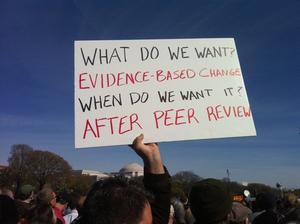
On May 13th, I blogged about a change in guidelines for clinical practice in Sweden. As in many other countries, CBT enjoyed near exclusive status as “evidence-based” on most official lists of approved treatments. Billions of Swedish crowns were spent on the approach that ultimately had no effect on the outcome of people treated for depression and anxiety. As a result, guidelines for clinical practice were reviewed and expanded.
Judging by the flood of comments, the news stirred considerable debate. Indeed, the managers of several list-serves wrote to me indicating that the post had generated heated discussions among their members. Several mental professionals wrote to me directly asking for references in English. Unfortunately, none to my knowledge exist. That said, if and when one becomes available, I will post the article or link here.
In the meantime, two developments. First, the Swedish Family Therapy Association posted a link for the translation of my article, “The Road to Mastery,” which originally appeared in the May-June 2012 issue of the Psychotherapy Networker. Anyone who reads and understands Swedish, can fine the article by clicking here. I am deeply grateful for the hard work that went into translating the piece and the attention giving to the topic by the leadership of SFFT.
OK. One more important research development of which every practicing clinician should be aware. Research, like the broader world of clinical practice, goes through fads and fashions. Methods and designs “catch on,” capturing attention, and subsequently emulated by others. Currently, one of the trends is comparing a particular treatment approach to “treatment as usual.” However, as my professor and mentor Bruce Wampold observes, “design is destiny.” Said another way: how you ask is what you get.
Attend a workshop or training and you’ll often hear presenters claiming that their preferred approach has proven more effective than “treatment as usual” (TAU) in randomized clinicial trials. Sounds impressive. It is, in fact, meant to impress. And yet, “how you ask is what you get.” As the study below documents, some TAU’s are destined to fail, purposefully employing TAU’s that are not designed to be therapeutic. Importantly, when a treatment approach is compared to a “treatment-as-usual-that-is-actually-a-real-bona fide-therapeutic approach” no differences in efficacy are found.
The implication? When considering whether to adopt a new method, or when claims are made regarding the superiority of a particular approach, clinicians need to ask, “what is being compared?” A long trail of evidence documents that, in general, all approaches work well. The challenge is finding “what works” for the individual client and practitioner. Adopting new approaches, available research makes clear, is no guarantee of improved outcomes. As is made clear in The Road to Mastery, time and resources are better spent determining one’s baseline level of performance. From there, practitioners can both identify when their current skills fall short and the training necessary to improve their individual performance.

Leave a Reply